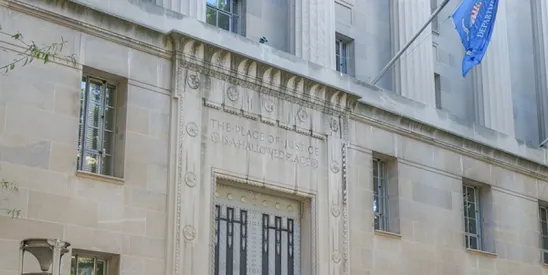Introduction
On the heels of President-Elect Trump’s announcement of the appointment of Mark Meador to the Federal Trade Commission (FTC) and designation of current Republican Commissioner Andrew Ferguson as the agency’s chair, the FTC and Department of Justice Antitrust Division (DOJ) (together, the “Agencies”) have withdrawn the Antitrust Guidelines for Collaborations Among Competitors (the “Collaboration Guidelines”), which were originally issued in April 2000. The Collaboration Guidelines detailed the Agencies’ analytical approach to collaborations between competitors, many of which it noted are “not only benign but procompetitive.” The Collaboration Guidelines also included “safety zones” which were “designed to provide participants in a competitor collaboration with a degree of certainty in those situations in which anticompetitive effects are so unlikely that the Agencies presume the arrangements to be lawful without inquiring into particular circumstances.”
The vote to rescind the Collaboration Guidelines was 3-2, with both Republican Commissioners issuing separate dissenting statements. Commissioner Ferguson’s dissent expressed support for revising FTC guidance from time-to-time in an effort to promote transparency and predictability for the public, but he noted that he disapproved of Biden-Harris officials withdrawing the guidelines so shortly before the impending presidential transition.
Commissioner Holyoak wrote: “The Majority’s decision to withdraw the [Collaboration Guidelines] without providing any replacement guidance, or even intimating plans for future replacement, leaves businesses grasping in the dark. As if that was not problematic enough, the Majority is withdrawing the Collaboration Guidelines right after an administration-changing election, further compounding today’s poor policy decision. The Majority had four years to address its concerns with the Collaboration Guidelines—now is not the time. I dissent.”
The move also follows a 4th Quarter victory for the FTC under Lina Khan’s leadership to successfully obtain an order preliminarily enjoining Kroger’s planned $24.6 billion purchase of Albertsons. The withdrawal leaves more questions than answers and is reminiscent of the Agencies’ withdrawal of the health care enforcement policy statements last year (which we wrote about here).
Follow the Yellow Brick Road (of Statutes and Caselaw)
Mimicking similar instructions in the Agencies’ previous withdrawal of the health care enforcement policy statements in 2023, the Agencies’ statement accompanying the decision encourages firms to “review the relevant statutes and caselaw to assess whether a collaboration would violate the law.” The Agencies further highlight their commitment to vigorous case-by-case enforcement and note that—similar to the health care enforcement guidelines withdrawal—the guidance was outdated and no longer reliable for the public in assessing the legality of competitor collaborations for several reasons.
- The Collaboration Guidelines do not reflect the evolution in jurisprudence under Section 1 of the Sherman Act in the Supreme Court and federal courts of appeal.
- The Collaboration Guidelines rely on “outdated analytical methods that fail to capture advances in computer science, business strategy, and economic disciplines that help enforcers assess, as a factual matter, the competitive implications of corporate collaborations.”
- The Collaboration Guidelines fail to address the competitive implications of artificial intelligence, algorithmic pricing models, vertical integration, and rollups.
Uncertainty in the Midst of Many Changes and New Regulators
The withdrawal of the health care guidance in 2023 left many open questions as to how the Agencies would approach information exchanges amongst competitors—largely because the “safety zones” for certain information exchanges were no longer valid for firms to rely on. Likewise, the withdrawal of the Collaboration Guidelines creates further uncertainty (including through removal of their own “safety zones”) and will likely result in similar consternation.
The Biden DOJ’s developing position on information sharing brought some but little clarity to the information sharing issue, at least regarding how the DOJ views information sharing through third-party conduits and/or algorithmic pricing tools. The subsequent withdrawal of the Collaboration Guidelines—which articulated in a nearly 40-page document the analytical framework the Agencies used to evaluate competitor collaborations and their potential procompetitive benefits or anticompetitive harms—now raises similar uncertainty issues for firms involved in competitor collaborations. In fact, the Agencies’ statement acknowledges that the Collaboration Guidelines are still embedded in other “still-good” guidance.
Conclusion
The guidance withdrawal occurs at a time when the incoming president has already announced his picks for the DOJ Assistant Attorney General for Antitrust and FTC Chair, as well as his nomination for the third Republican FTC Commissioner. The incoming leadership will inherit this decision along with other antitrust litigations filed under the Biden Administration. It remains to be seen what position the incoming leadership will take on this issue and others, including the 2023 revision of the Agencies’ Merger Guidelines and the forthcoming changes to the HSR rules.
For the time being, parties with uncertainty as to whether certain information can be shared with a competitor—whether directly, through a third party, or through an algorithmic pricing tool—should engage antitrust counsel early and often. Parties considering joint ventures and other collaborations with competitors should likewise exercise similar caution and involve antitrust counsel at the outset and throughout the structuring and negotiation of any potential deal.






 />i
/>i
